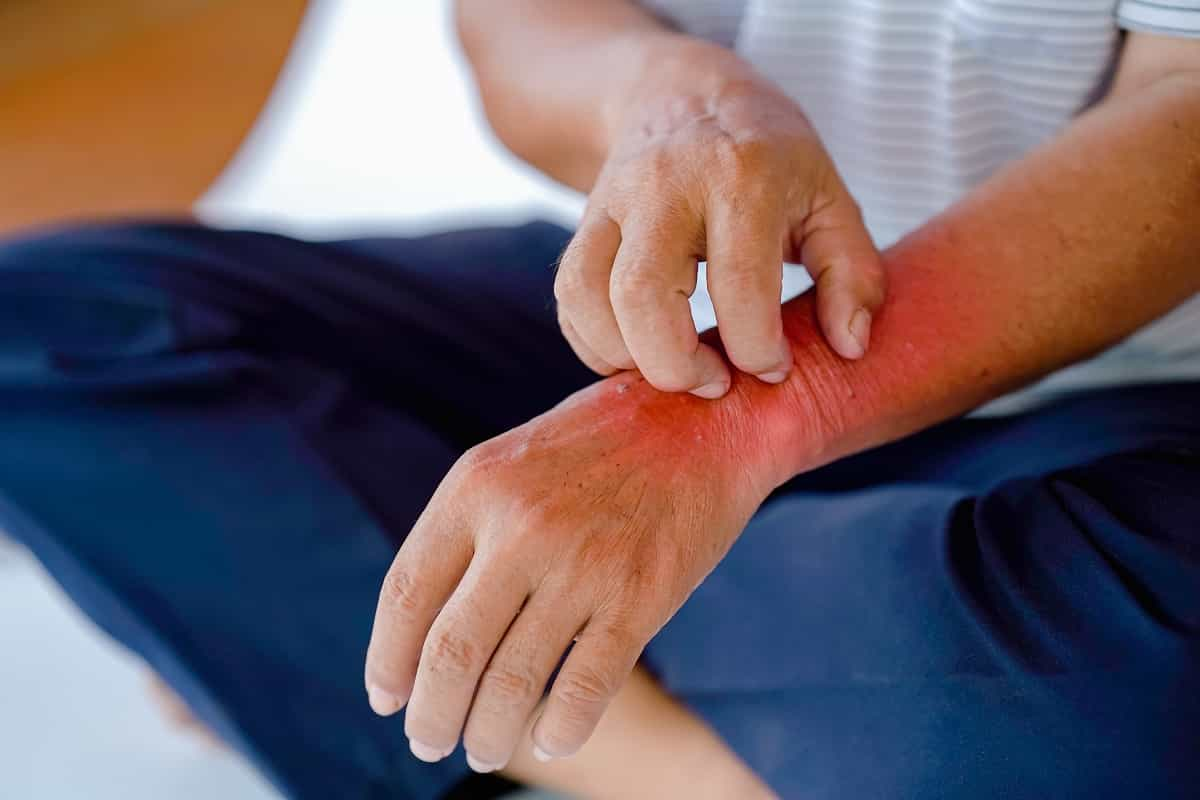Atopic dermatitis is a chronic inflammatory skin disease affecting up to 20% of the population. Furthermore, it is the most common form of eczema and occurs mainly in children, but can affect adults as well.
Atopic dermatitis results from a combination of genetic and environmental factors . These elements help create an overactive state of the immune system , which can lead to an overreaction to irritants such as bacteria, pollution, detergents, perfumes and allergens. Mites are tiny animals, with dimensions between 200 and 400 thousandths of a millimetre, belonging to the Arachnida family, they feed on human and animal dandruff and skin flaking, they hide from the light and above all they hide in mattresses and pillows, where it is more easy to eat, as they are in close contact with our body.
Considering that we spend around 1/3 of our lives in bed, close contact with mites is prolonged.
How many manifestations of atopic dermatitis are there?
Depending on the age of the patient, atopic dermatitis can manifest itself in different ways. In children, it is usually characterized by a dry, itchy rash, mostly on the cheeks, legs and arms. Additionally, children with atopic dermatitis are often more prone to skin infections and food allergies.
In adults, the symptoms of atopic dermatitis can be more variable. Some people just feel itchy, while others get a rash all over their body. Additionally, many people with atopic dermatitis develop dry, flaky skin, which can make them more susceptible to skin infections and allergies. In fact, atopic dermatitis typically affects the hands, feet, inner creases of the elbows and the backs of the knees, wrists, ankles, face, neck and chest. Manifestations around the eyes are also common. Seasonal changes and psychological stress are among the main causes of atopic dermatitis.
How is atopic dermatitis diagnosed?
The diagnosis of atopic dermatitis is based primarily on the patient’s symptoms and medical history . The attending physician can examine the patient’s skin and assess the degree of itching and inflammation.
In some cases, your doctor may order skin tests to determine if you have food or environmental allergies that could be a trigger for atopic dermatitis.
What treatment options are available?
Treatment for atopic dermatitis varies depending on the severity of symptoms and individual patient response. In general, doctors recommend a combination of medications and avoiding triggers. For mild forms of treatment , topical cortisones or some immunomodulators, always topical, such as tacrolimus and pimecrolimus are used. In the forms of atopic dermatitis that affect very large areas of the skin, phototherapy can also be used.
To relieve itching and inflammation, your doctor may prescribe antihistamines, topical corticosteroids, moisturizers, and topical immunomodulators. Also, if the patient’s skin becomes infected, immunosuppressant drugs or antibiotics may be prescribed.
Your doctor may also recommend avoiding food allergies, wearing light fabrics made from natural fabrics like cotton, avoiding frequent washing, avoiding contact with detergents or chemicals that can irritate your skin, and keeping your head and body clean and staying well hydrated .
Also, your doctor may recommend using soothing creams on your skin at night and avoiding skin care products with harsh ingredients, such as soaps, conditioners, lotions, and other products that can cause irritation.
What is the long-term outlook for people with atopic dermatitis?
Atopic dermatitis is a chronic disease that can have a major impact on a patient’s quality of life. However, many people are able to manage symptoms with a combination of medications and avoiding triggers.
Also, most children who develop atopic dermatitis as children recover gradually as adults. While some people may continue to experience symptoms into adulthood, their life course can be significantly improved through symptom management and prevention of skin infections and allergies.
You may also like
Symptoms and treatment of atopic dermatitis in women
Atopic dermatitis is a common skin condition that affects both men and women, but appears to be more common in women . Atopic dermatitis, also known as atopic eczema , is a chronic condition that can be debilitating for sufferers. Atopic dermatitis is characterized by dry, itchy, red skin . These symptoms can appear on… Continua a leggere Symptoms and treatment of atopic dermatitis in women
Combatting Hair Loss: Current treatments and promising studies
Hair loss affects millions globally, manifesting distinctively across genders. With varying incidences worldwide, understanding its causes is crucial. This article delves into symptoms, current treatments, and promising studies, shedding light on related skin and dental issues.
Acne: The disparities between teenage and adult acne
Acne, a common skin condition, affects millions globally, transcending age and geography. This article delves into the symptoms, the disparities between teenage and adult acne, and explores both traditional and revolutionary new treatments, including those still under trial. Additionally, it covers related dermatological issues like hair loss, atopic dermatitis, psoriasis, and dental care advancements.
Atopic Dermatitis: New treatments and research studies are transforming patient care worldwide.
A comprehensive exploration of atopic dermatitis, psoriasis, and related skin conditions including hair loss, acne, and dental care. New treatments and research studies are transforming patient care worldwide.
Dental Implants and Oral Hygiene: Methods and Treatments
This article delves into the world of dental implants and oral hygiene, exploring various methods and treatments available. It highlights the challenges associated with maintaining dental hygiene, the intricacies of implantology, and emerging research in the field. Additionally, it touches upon the innovative treatments for related concerns such as hair loss, atopic dermatitis, psoriasis, and acne.
